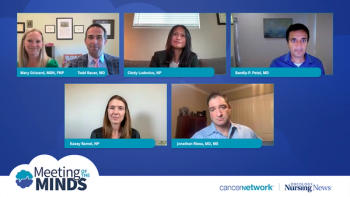
This video segment discusses strategies for patient education and preparation for second-line treatment with RAS GTPase inhibitors, as well as therapeutic options to consider if a patient progresses on adagrasib.

Your AI-Trained Oncology Knowledge Connection!


This video segment discusses strategies for patient education and preparation for second-line treatment with RAS GTPase inhibitors, as well as therapeutic options to consider if a patient progresses on adagrasib.

This video segment explores the potential role of KRAS-targeted therapies in the frontline treatment of KRAS-positive metastatic NSCLC, highlighting considerations for specific patient populations and disease characteristics.

This video segment examines strategies for managing adverse events associated with adagrasib, comparing its safety profile to other RAS GTPase inhibitors like sotorasib, and discusses key differences, benefits, and risks that may influence treatment selection or consideration of clinical trials.

This video segment discusses the efficacy and safety profile of adagrasib for KRAS-positive metastatic NSCLC, drawing insights from the KRYSTAL-1 trial data to inform treatment sequencing decisions.

A 58-year-old retired teacher treated with adagrasib for KRAS+ metastatic NSCLC.

This video segment explores emerging investigational agents for the management of metastatic ALK-positive NSCLC, highlighting promising advancements in the treatment landscape.

This video segment examines therapeutic strategies for managing disease progression on lorlatinib in ALK-positive metastatic NSCLC, including decision-making considerations and scenarios where switching to lorlatinib from another ALK inhibitor may be beneficial.

This video segment provides an in-depth discussion on the first-line use of lorlatinib for ALK-positive metastatic NSCLC, including clinical evidence from the phase 3 CROWN trial, the broader therapeutic landscape and alternative strategies, real-world insights on lorlatinib's performance, and key considerations for selecting among ALK inhibitors based on patient-specific factors.

This video segment reviews the clinical evidence supporting lorlatinib as a first-line treatment for ALK-positive metastatic NSCLC, emphasizing key efficacy outcomes from the phase 3 CROWN trial.

This video segment explores the critical role of biomarker testing in identifying patients with ALK-positive NSCLC, discussing the clinical characteristics that guide the use of ALK inhibitors and addressing challenges in implementing comprehensive molecular testing in community settings.

A panel of experts review a case of a 55-year-old mom and high school teacher who received lorlatinib for ALK+ NSCLC with brain metastases.
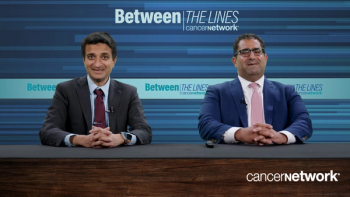
Panelists discuss key takeaways from the analysis of long-term results, noting that these findings may influence their recommendations for first-line regimens in EGFR-mutant metastatic non–-small cell lung cancer. They highlight how they engage patients in discussions about treatment options, considering efficacy and safety, while addressing remaining unmet needs in this therapeutic area.

Panelists discuss the National Comprehensive Cancer Network (NCCN) guidelines for first-line treatment of EGFR-mutant metastatic non–small cell lung cancer (NSCLC), emphasizing the recommended therapies and best practices for patient management.
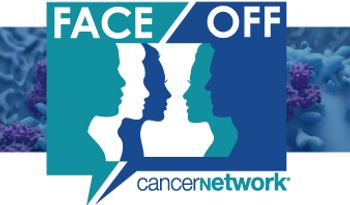
Following a comprehensive debate on the treatment of patients with non–small cell lung cancer, Edward Kim, MD, presents the winning team with the title of victors of this CancerNetwork® Face-Off event.

Continuing discussion on the treatment of patients with EGFR-mutated NSCLC, Sandip P. Patel, MD, discusses the role of EGFR TKIs without chemotherapy.

Focusing on data from the FLAURA2 study, Erminia Massarelli, MD, PhD, MS, outlines the role of EGFR TKI plus chemotherapy for patients with EGFR-mutated NSCLC.

Teams from University of California San Diego and City of Hope debate whether neoadjuvant therapies will replace surgery plus adjuvant treatment for patients with resectable NSCLC.

Karen M. Yun, MD, discusses the role for neoadjuvant chemoimmunotherapy in patients with resectable non–small cell lung cancer.

Ramya Muddasani, DO, MS, leads a discussion on the treatment of a patient with metastatic NSCLC with a KRAS G12C mutation, highlighting the utilization of sotorasib and the CodeBreaK 100 trial.

Sandip P. Patel, MD, reviews the case of a patient with PD-L1–negative NSCLC and discusses treatment practices.

Ramya Muddasani, DO, MS, presents the case of a patient with EGFR-mutated NSCLC following osimertinib treatment and shares insights gleaned from the INSIGHT 2 trial.

Initiating a conversation on patient cases, Karen Yun, MD, presents the profile of a patient with metastatic ROS1 fusion-positive non–small cell lung cancer.

Jyoti Malhotra, MD, MPH, reviews data from the phase III POSEIDON study evaluating durvalumab with or without tremelimumab in combination with chemotherapy as first-line therapy for patients with metastatic NSCLC.

Amanda Herrmann, MD, discusses findings from the 5-year update from CheckMate-9LA investigating nivolumab, ipilimumab, and chemotherapy in patients with metastatic NSCLC.

Karen Yun, MD, opens the discussion by presenting data from the ALTA-1L and BRIGHTSTAR studies on advanced ALK-rearranged non–small cell lung cancer.

Erminia Massarelli, MD, PhD, MS, presents 5-year progression-free survival and safety data from the CROWN study comparing lorlatinib with crizotinib in treatment-naïve patients with advanced ALK+ NSCLC.

Edward Kim, MD, introduces a CancerNetwork® Face-Off program in which University of California San Diego and City of Hope will present clinical trial data and discuss treatment practices in non–small cell lung cancer (NSCLC).

Panelists discuss how they implement prophylactic strategies for treatment-related adverse events in the MARIPOSA study and how they counsel patients about managing these effects.

Panelists discuss how the MARIPOSA study shows more patients in the amivantamab-lazertinib arm continued treatment compared to osimertinib, and many who progressed initiated subsequent therapy, primarily with carboplatin-pemetrexed.

Panelists discuss insights from the MARIPOSA study on first-line treatment options for EGFR-mutant metastatic non–small cell lung cancer (NSCLC), highlighting the efficacy of amivantamab-lazertinib over osimertinib, the importance of managing adverse events, adherence to National Comprehensive Cancer Network guidelines, and the need for patient engagement in treatment discussions to address unmet needs.
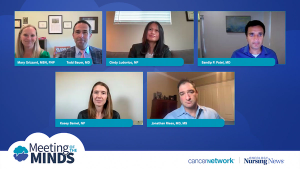
Published: February 7th 2025 | Updated:
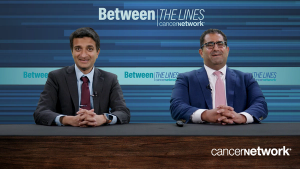
Published: October 15th 2024 | Updated:

Published: October 22nd 2024 | Updated:
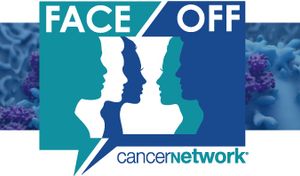
Published: October 21st 2024 | Updated:
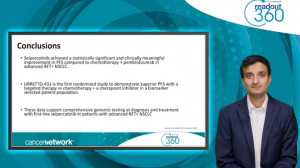
Published: November 10th 2023 | Updated:

Published: June 6th 2024 | Updated: